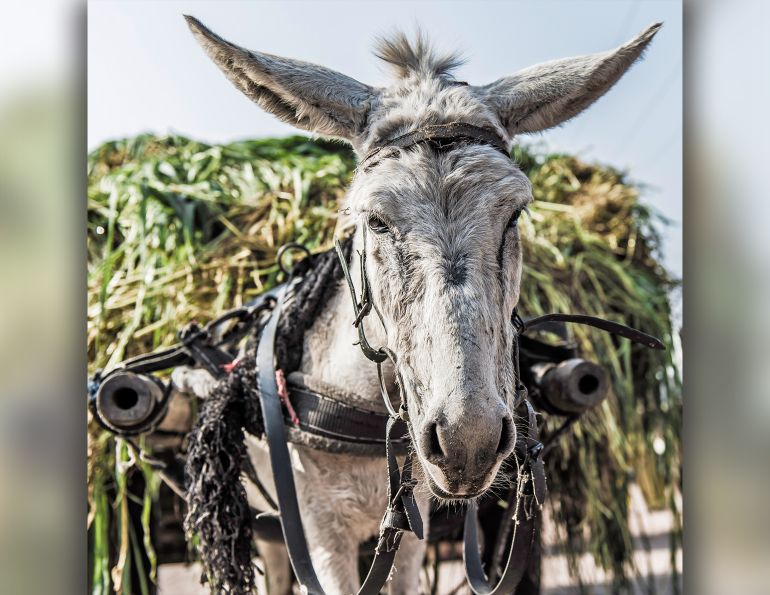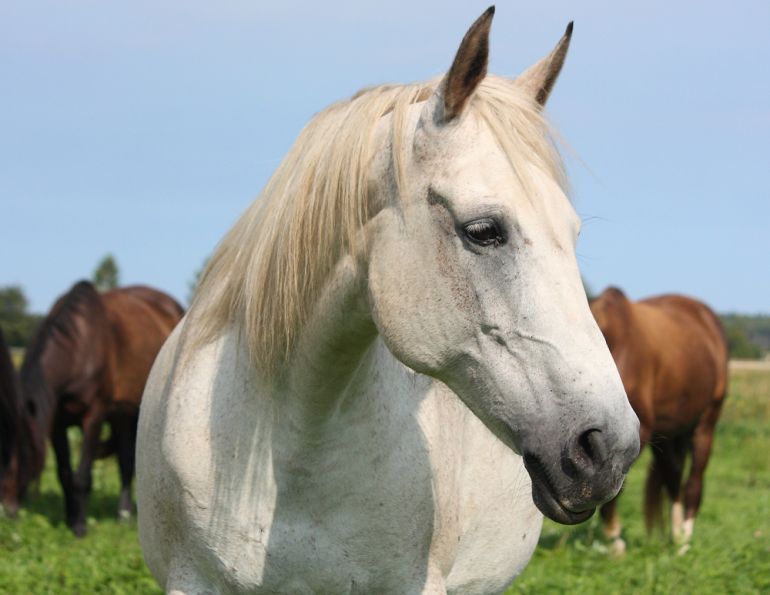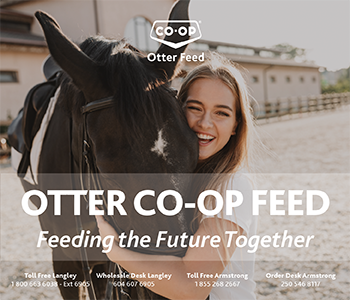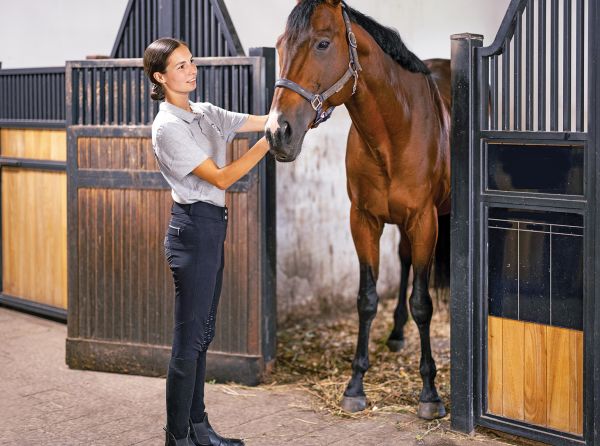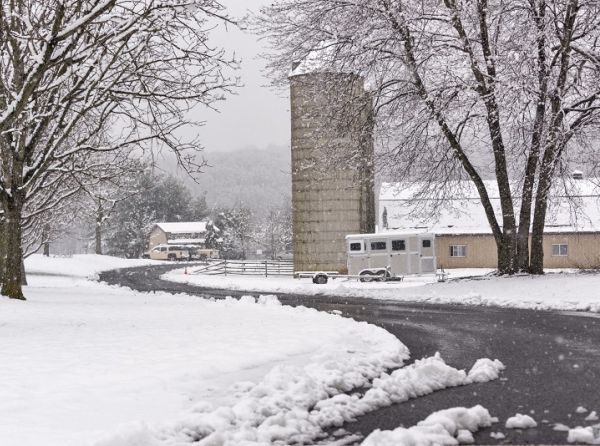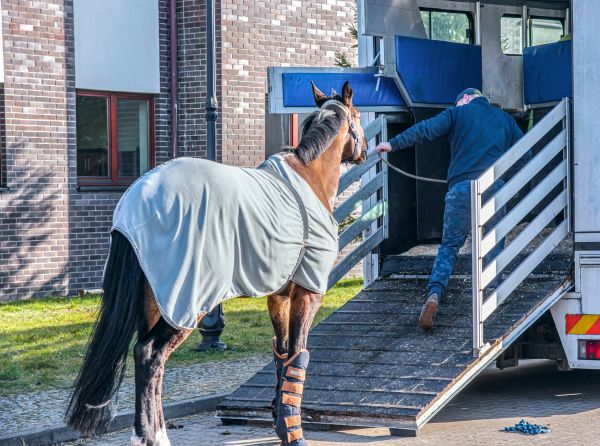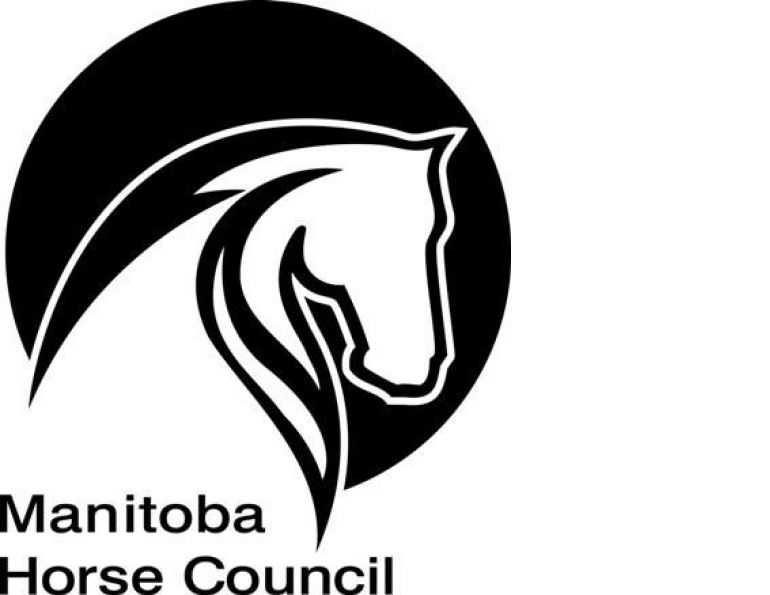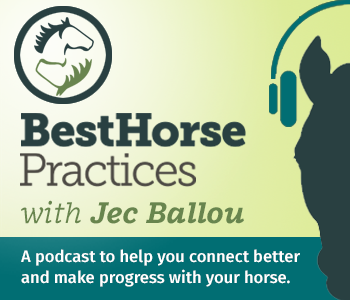By Margaret Evans
Two thousand years ago in Bethlehem, a tiny donkey carried Mary to that famous Grotto now beneath the Church of the Nativity, and which provided sanctuary for Jesus’ birth. Today, just 76 kilometres away near the coastal town of Netanya in Israel, another sanctuary, Safe Haven for Donkeys in the Holy Land, provides protection and care for donkeys that have been abused, beaten, malnourished or injured.
“The sanctuary in Israel is a four-acre site, currently home to just over 220 donkeys,” says Wendy Ahl from the Sanctuary’s UK office in Haywards Heath, West Sussex. “It is in an agricultural village known as a ‘moshav’ [a cooperative community of farmers]. There is a dedicated team of local staff caring for the animals, all of whom have been with the charity for some years. Feeding and mucking out is a full-time task and a veterinary surgeon visits daily to check on the health of the donkeys. A farrier and a donkey dentist also visit the sanctuary regularly.”

Safe, well cared for, and loved at Safe Haven for Donkeys. Photo courtesy of Safe Haven for Donkeys
Safe Haven for Donkeys was started in 2000 to help some of the thousands of donkeys facing neglect, cruelty, and abandonment in Israel and the Palestinian territories. The most common situations the donkeys face are neglect, lack of food and water, overwork, and poor harnessing causing wounds.
“Often the owners are not unkind. They just have no idea how to care for their animals,” says Ahl. “For example, they often do not realise that daily grooming is not just cosmetic. It removes parasites from the coat. Many owners believe it harms the animals to drink water in the day, whereas of course we know the opposite is true. The owners are often so poor that they make the harnessing out of whatever material comes to hand. It is poverty, not cruelty, which is most often the cause of the donkeys’ problems. However, as in any country, there are sometimes cases of direct cruelty to the animals.”

The most common situations the donkeys and mules face are neglect, overwork, poor harnessing causing wounds, and lack of food and water. Many owners believe it harms the animals to drink water during the day, which in the hot climate can result in severe dehydration. Photo courtesy of Safe Haven for Donkeys
Barnie was found abandoned by the side of the road, probably because he was blind. Philippa was found overworked and beaten, and the donkey’s owners were persuaded to hand her over to the sanctuary. A local man called the sanctuary after witnessing Toffee being beaten by a gang of youths.
Murphy was rescued from the Palestinian village of Jbara on the Israel/Palestine border when he was about two years old. His tiny body was covered in dents and wounds and he had lost an eye due to being beaten with electric cable. He was rescued, his health eventually recovered and, except for the lost eye, he is now a healthy, happy donkey.
Little Dusty was found abandoned on the streets of Qalqilya in the Palestinian territories. He was only about a month old and calling for his mother when he was brought to the sanctuary where he settled in with many new friends.
Burnie was rescued in 2007. As a stray, he had wandered onto someone’s land and, rather than calling the sanctuary, someone deliberately set him on fire. No one was identified as everyone denied all knowledge of the incident. “Burnie was brought back to the sanctuary where visiting British veterinary surgeon Dr. Stuart Easby treated his wounds,” says Ahl. “He had such severe burns that it was touch and go whether we should have him euthanized, but we decided to give him a chance and applied intensive daily treatments to his burns, including Manuka honey. Eight years on, Burnie is a different donkey. Some of his fur has even grown back and he is kept in an enclosure near the entrance to the sanctuary where he greets every visitor as though he were a large dog rather than a donkey.”

Above and Below: Burnie arrived at the sanctuary in 2007 with severe burns from being deliberately set on fire when he strayed onto someone’s land. After intensive nursing and treatment he recovered and now, eight years later, some of his fur has grown back and he greets every sanctuary visitor happily. Photo courtesy of Safe Haven for Donkeys

The sanctuary also operates a mobile vet clinic, which visits around 20 different locations every month, mainly in the West Bank, which forms the bulk of the Palestinian territories as well as in Israel.
Ahl says that the donkey owners are extremely grateful for the charity’s help and support with caring for their donkeys, mules, and horses as often they do not know how to do many basic horse care routines themselves or simply cannot afford to do so. Education is a vital part of each clinic, helping owners to understand that if their donkey stays healthy, their animal will be able to work harder and longer for them.

Horses are luckier than donkeys, and generally receive better care. Animal owners who do not know how to do basic equine care and cannot afford to pay for it are grateful for the charity’s help. Photo courtesy of Safe Haven for Donkeys
Local children also visit the sanctuary to learn about the importance of humane animal care and welfare. This is vitally important as the visits sow in their young minds the seeds of understanding the need and appreciating the value of humane care. They will take that knowledge into their adult life when they will need to depend on animals for their own livelihood.

Education is an important part of each clinic. Owners are helped to understand that if their animal stays healthy it will be able to work harder and longer. Photo courtesy of Safe Haven for Donkeys
One little donkey lucky to be saved was Lukman, named after a man who worked at the sanctuary. He found the donkey in his village, Qalansuwa. He was by the road where a crowd of youths were kicking and ridiculing the donkey and trying to force him to walk into the path of oncoming traffic. Lukman reprimanded them severely, then took the donkey home where he kept his horse and goats. The donkey was transferred to Safe Haven where, at first, he was terrified of being touched. But in time Lukman became confident enough to trust humans. And now he has a good friend in Ellie, another donkey about the same age as him.
Ahl says that, given the hostile flare-ups of tensions between Israel and the West Bank, it can sometimes be difficult to provide care for animals.
“The veterinary surgeon Dr. Jaber Kadan, who is in charge of the mobile clinics, is an Israeli Arab, so he has no problems accessing the West Bank, but as the violence seems to flare up in the afternoons/evenings, he has to visit early to avoid any problems,” says Ahl. “There is always, of course, the worry that if the problems get really bad, the border crossings between Israel and the West Bank could be closed, which would make it impossible to access the areas that so badly need our help. But so far this has not happened.”
She says that donkeys are considered the lowest of the low in Israel and Palestine so not as much attention is given to their care as, for example, horses. As the mostly Muslim owners do not believe in castrating their animals, there is no shortage of donkeys. And it is easier to discard an old or sick animal and get a new one rather than pay for veterinary care.
“We are therefore trying to promote the importance of castration and offer this service free of charge to all donkey owners using our clinics. There are also customs, such as the belief that drinking water during the day is bad for the animals, and also we have come across ‘nostril slitting,’ which some owners do in the mistaken belief it will help the animals breathe more easily.”
This is where education is so important to help donkey owners understand the necessity of access to water, especially in a hot climate, and that the widespread practice of nostril slitting is cruel and unnecessary. It can be hard to change the engrained beliefs of the more elderly people, but reaching the open minds of children helps to set an encouraging path for the future.

Playful donkeys at the sanctuary are relaxed, healthy, and happy. Photo courtesy of Safe Haven for Donkeys
Clinics across the West Bank include those at Nablus and Qalqilya, and various villages in the region where hundreds of donkeys are seen on a regular basis. In a three month period this year, the vets checked and treated l,611 donkeys, mules, and horses. The equines received routine deworming, hoof trimming, and dental checks. In addition, surgeries were carried out, including treatments for skin cancer, castrations, and infections such as sinusitis, which require drainage and flushing. Then there are problems with dehydration, colic, diarrhea, pneumonia, flu, eye infections, abscesses, skin issues such as excessive itching, lameness in the feet and legs including laminitis, and sometimes, severe cases of injury or illness in which euthanasia is the only option.

Hundreds of donkeys are seen regularly in villages across the West Bank, where they receive routine deworming, hoof trimming, and dental checks. Photo courtesy of Safe Haven for Donkeys

In addition to routine health checks, veterinary surgeon Dr. Jaber Kadan (front, right) carries out surgeries at the clinics to treat conditions such as sinusitis and skin cancer, as well as castrations. Photo courtesy of Safe Haven for Donkeys
Yet amid all the distressing stories of rescue, there are heart-warming stories that highlight how local residents value the work of Safe Haven.
White Jack is a five-year-old male donkey whose owner is Husam Hammad. They live in a village called Azmout, near Nablus. Husam routinely brings White Jack to the Safe Haven location in Nablus for checkups, and twice-yearly deworming treatments, hoof trimming, and a dental check. White Jack’s work is to help herd Husam’s flock of sheep and he grazes with them on plots of land between the many small villages. He also carries food, water tanks, and blankets. His close friend is a dog named Rex. When White Jack became more than a little interested in the local female donkeys and a bit more uncontrollable, Husam decided it was time for castration, a highly progressive decision given local cultures. White Jack spent a few days at the Nablus clinic and was anaesthetized for the routine surgery. Sitting right beside him was Rex, waiting patiently for him to wake up.
Needless to say, simple veterinary supplies are in constant demand at the sanctuary and for the mobile clinic. In England, donations are used to buy necessities such as vet wraps and bandages, antiseptic ointments, one-side non-stick dressings, equine eye wipes and ointments, head collars, numnahs, fly repellent gels, grooming brushes, and hoof picks.
If you would like to help Safe Haven for Donkeys in the Holy Land, check out their wish list on www.amazon.co.uk. Click on “wish list” in the top right hand corner, then type Safe Haven for Donkeys in the Holy Land in the search bar. Their list comes up. Any purchases you make on the wish list site are shipped directly to their UK office then boxed and shipped to Israel along with other gifts that have been donated. It is simple, easy, and effective.

Fundraising is ongoing in order to continue providing the essential services to animal owners, and to feed and care for the animals residing at the sanctuary. Photo courtesy of Safe Haven for Donkeys
Find out much more about the sanctuary on their website at www.safehaven4donkeys.org. There is a lot of great information in the back issues of their newsletters.
Main photo courtesy of Safe Haven for Donkeys








